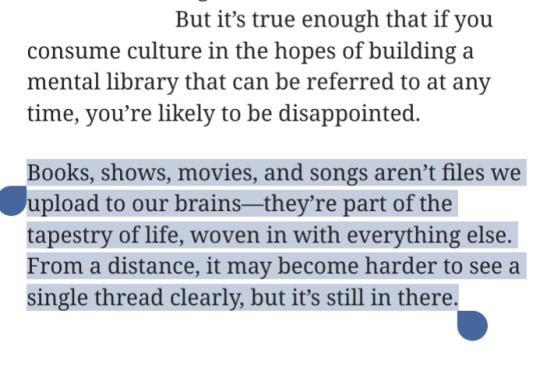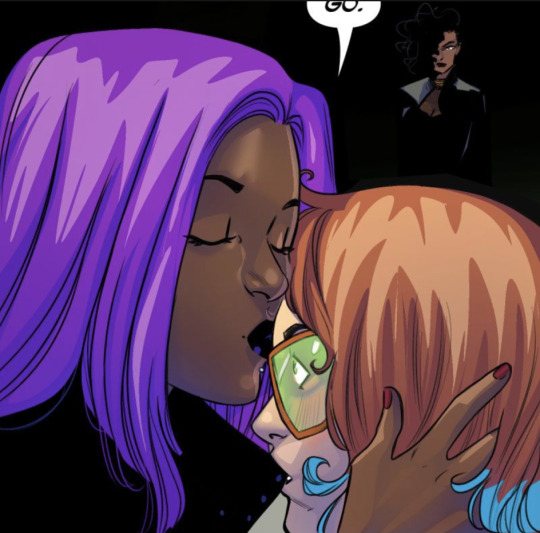#julie beck
Text

—Julie Beck, "Why We Forget Most of the Books We Read", pub. The Atlantic [ID'd]
#q#quotes#essays and articles#typography#id included#julie beck#why we forget most of the books we read#the atlantic#m#x
2K notes
·
View notes
Text
When children are together, they develop their own rituals, traditions, games, and legends—essentially, their own folklore, or, as researchers call it, “childlore.” That lore can be widespread and long-lasting—the mind boggles to think how many generations of children have played tag, for instance. Even seemingly more modern inventions, such as the “cool S”—a blocky, graffiti-ish S that has been etched into countless spiral-bound notebooks—are a shared touchstone for many people who grew up in different times and places in the U.S. How is it that so many children across time and space come to know the exact same things?
Children themselves probably couldn’t tell you where their lore began. If you ask a kid where a particular game or rhyme came from, they’ll likely tell you they invented it, Rebekah Willett, a professor at the Information School at the University of Wisconsin at Madison who has studied childlore, told me: “They cannot trace it, and they have no investment in tracing it.” Indeed, thinking back to the lore of my own youth, I have no idea how my friends and I thought to give each other “cootie shots” with the lead of a mechanical pencil, or why everyone in my elementary-school art class would smear their hands with Elmer’s glue, wait for it to dry, and then methodically peel it off (other than the fact that it was super fun and I would do it again right now if I had some glue nearby). These things were almost like analog memes, micro-bits of culture that seemed to come from nowhere and everywhere.
Also like memes, where childlore comes from is arguably less important than how it spreads and why it gains traction in the first place. The main way childlore spreads is, perhaps obviously, by children teaching it to one another. Older kids mentor younger ones both at school and at home, where siblings play a vital role in passing jokes and games down through generations. As for how childlore spreads geographically, there are a couple of key players. One is the new kid, who shows up at school with a pocketful of lore from elsewhere. The other is cousins, who are many kids’ closest peers who don’t attend their school.
Adults have a role to play in perpetuating childlore as well, albeit a supporting one. Parents and teachers share nursery rhymes, folk songs, and games with kids, and adults create the movies, books, and TV shows that kids consume. Our nostalgia for our own childhood shapes what kids get exposed to. But Steve Roud, a British folklorist and the author of The Lore of the Playground, emphasized to me that folklore is by its nature not handed down by an authority. It is of the people, by the people—even if those people are children. So although kids may crib from pop culture and adopt things they learn from adults, making something their own and using it for their own purposes is what transmutes it into childlore. PAW Patrol is not childlore; a game that kids invent on the playground using PAW Patrol characters is.
As Iona and Peter Opie, two pioneers in the childlore field, wrote in their 1959 book, The Lore and Language of Schoolchildren, “The scraps of lore which children learn from each other are at once more real, more immediately serviceable, and more vastly entertaining to them than anything which they learn from grown-ups.” And some information—such as how to summon Bloody Mary in a mirror or guarantee a snow day by wearing your pajamas inside out—you simply cannot rely on grown-ups to impart anyway.
As for what kinds of things become popular, Alex Mesoudi, who studies cultural evolution at the University of Exeter, in the U.K., pointed me toward two main forces that influence whether a particular chunk of culture will spread. One, which you could call “catchiness,” is whether the content of the lore itself is likely to be “remembered, passed on and adopted by others,” he told me in an email: For instance, a pithy song that rhymes and repeats is probably more memorable than a long, winding one. The other is the context in which you learn about a thing, and how high-status that context is—it could be the hot pop-culture trend of the moment or just associated with the popular kids at school. I’ll call this “coolness.” (And, of course, the allure of naughtiness cannot be overstated. Anything adults have deemed taboo is a hot commodity in kid society.)
— How the Traditions of Childhood Get Passed Down
#julie beck#how the traditions of childhood get passed down#history#psychology#sociology#child development#childlore#children#games#nursery rhymes#rebekah willett#steve roud#iona opie#peter opie#alex masoudi
26 notes
·
View notes
Text

"I'm a Little Teapot... Or Am I?"
by Julie Beck
juliebcreative on IG
5 notes
·
View notes
Text
The Place You're From and the Place You're At
Niall Williams, Louis Untermeyer, Julie Beck: 'The Place You're From and the Place You're At'

[Image: “What Do Now? (Tallahasssee, Florida),” by John E. Simpson. (Photo shared here under a Creative Commons License; for more information, see this page at RAMH.)]
From whiskey river:
We’re a race of elsewhere people. That’s what makes us the best saints and the best poets and the best musicians and the world’s worst bankers. That’s why wherever you go you’ll see some of us — and it makes…
View On WordPress
2 notes
·
View notes
Text
instagram
0 notes
Text
Sinister Six meeting where the rest of the six hold an intervention for Mysterio cause constantly breathing in weed smoke in a fish bowl can’t be healthy.
#sinister six#mysterio#quentin beck#spiderman#spider-man#marvel comics#that shit is so fogged up and concentrated you cant see his face#him doing vape tricks and they explode from his helmet like the 4th of july fireworks
70 notes
·
View notes
Text




if i had a nickel for every time avengers academy got me hooked on a mixed-race couple and a couple adorable lesbians, i'd have two nickels. which isn't a lot but it's weird that it happened twice.
#avengers academy#ken mack#mettle#jennifer takeda#hazmat#julie power#lightspeed#karolina dean#aaron fischer#qaari beck#mysteriant#brielle brooks#bloodline#shela sexton#escapade#YES i know julie's bisexual#but my god they're all adorable and i love them
7 notes
·
View notes
Text

IG Tom Wlaschiha 1 Juli 2024
serious party business filmfestmunich
bavariafiction
16 notes
·
View notes
Text
re: gideon and the 6 girls he has in cryogenic stasis i truly believe julie would be uncontrollably angry not because he has 6 girls in a freezer but because he expects her to share
#scott pilgrim takes off#goosepowers#mixing up anime and comic canons w this sorry#i like thinking about how different gideon is in both like hes still awful. but comic gideon is so much more Blaring siren red flag#however julie has the power of being julie powers i think she can fix him solely by out-crazying him#he should be shaking with glee to be at her beck and call
33 notes
·
View notes
Text
#18 || Super Cool from The LEGO Movie 2: The Second Part --- Beck, Robyn and The Lonely Island
youtube
#song of the day#song recs#song recommendation#music#the lego movie#the lego movie 2#the lego movie 2: the second part#super cool#beck#robyn#the lonely island#14 July 2024 --- Maxime#Spotify#Youtube
3 notes
·
View notes
Text
"People are binging on the written word, too. In 2009, the average American encountered 100,000 words a day, even if they didn’t “read” all of them. It’s hard to imagine that’s decreased in the nine years since. In “Binge-Reading Disorder,” an article for The Morning News, Nikkitha Bakshani analyzes the meaning of this statistic. “Reading is a nuanced word,” she writes, “but the most common kind of reading is likely reading as consumption: where we read, especially on the internet, merely to acquire information. Information that stands no chance of becoming knowledge unless it ‘sticks.’”
Or, as Horvath puts it: “It’s the momentary giggle and then you want another giggle. It’s not about actually learning anything. It’s about getting a momentary experience to feel as though you’ve learned something.”
Julie Beck, "Why We Forget Most of the Books We Read", pu. The Atlantic
#q#quotes#essays and articles#julie beck#why we forget most of the books we read#on books and reading#m#x
333 notes
·
View notes
Text
Although some elements of childlore last and last, others come and go with the culture of the moment. But even then, Willett told me, kids often build on what came before, whether they realize it or not. For instance, COVID-19 has shown up in many kids’ games, including coronavirus tag— which is, of course, built on one of the most classic kids’ games there is. (Roud suspects that in Victorian times, European children played cholera tag or something similar.) Another example Willett gave, from one of her studies, was a game based on the Weeping Angels from Doctor Who—monsters that can move only when you’re not looking at them. Even though the game was inspired by pop culture, Willett noted that a game where you creep up on someone while they’re not looking is a very old structure. One such game, Grandmother’s Footsteps, dates back to at least the 1900s, she writes.
— How the Traditions of Childhood Get Passed Down
#julie beck#how the traditions of childhood get passed down#psychology#sociology#child development#children#childlore#games#covid 19#pandemic#tag
3 notes
·
View notes
Text


#July 9, 2022 #Jeff Beck #tour #Opéra De Monte-Carlo #Monaco #fans
2 notes
·
View notes
Audio
Why do you want me today?
Is it because you think you're wonderful?
Am I fun to play?
Why do you want me today?
Is it because you think you’re wonderful
Or is it because you think you’re worth less than nothing at all?
#beck + call#july talk#The genre is wrong but the vibes are very steddie#Steddie#steve harrington/eddie munson#If I could think of a plot I'd write this song fic but I am bunny-less#those boys need therapy#can't tell me it would be a healthy relationship right off the bat#they're traumatized babies
18 notes
·
View notes
Text
youtube
What do you want me to say?
0 notes
